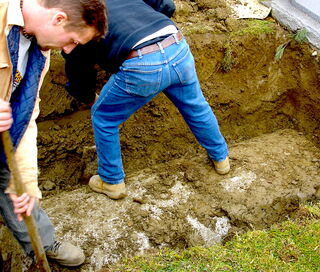Genetics
My Daddy’s a Serial Killer
What motivates people to make these shocking claims?
Posted November 4, 2022 Reviewed by Tyler Woods
Key points
- A woman in Iowa claims that her father once murdered dozens of women, undetected.
- Inconsistencies in her accusations raise questions about her motivation.
- Other people accusing their fathers of such crimes can help us make sense of the Iowa case.

Recently, we’ve seen news coverage about a previously unidentified serial killer who allegedly recruited his kids to help bury dozens of bodies. Cadaver dogs alerted authorities to specific sites on a property near Thurman, Iowa, and the FBI has taken an interest. Lucy McKiddy, the daughter of Donald Dean Studey, says her father murdered half a dozen women each year over several decades. He then made her help him bury them in and around an abandoned 90-foot well on his five-acre property.
Depending on if any – and how many – sets of remains are unearthed, he might be the country’s most prolific killer. Or, maybe not. We’ve seen such claims before. Some panned out; others didn't. Why such accusations are leveled depends on circumstances and mental state.
McKiddy says the victims were mostly sex workers and runaways that her father picked up. He killed them inside a trailer and used a wheelbarrow or a toboggan to haul them, depending on weather conditions. Lucy feared her father would one day kill her, so she dutifully dumped dirt and lye on the corpses. She recalls that most wore clothing and jewelry. The father allegedly kept gold teeth as trophies.
Yet her older sister, Susan, denies that any of this happened. She says she never even heard these claims until a year ago. She acknowledges that their father was strict and had a few run-ins with police but resists the idea he's a serial killer. (Another sister couldn’t be reached and a brother is deceased.)
Studey died in 2013. It’s unclear whether reporters have looked into Lucy’s alleged contacts with police, teachers, and priests over the past 45 years. She says no one would listen, although investigators did explore the property in 2007 and turned up nothing. Chief Deputy Tim Bothwell said they couldn't locate the well.
Studey’s two wives died by suicide, which adds another twist. McKiddy’s victim toll has been inconsistent, varying between five and 70. In some accounts, she buried them. In others, she only “knew about” them.
But why would Lucy McKiddy—or anyone—make up such a disturbing story about her own father? If she has, she wouldn't be alone. The group of such accusers is too small to run a meaningful analysis, but accusing offspring have mostly shown one of three motives: a grudge against the father, the need to stop a killer or to reveal the truth, or a delusional disorder.
Motive 1: Grudge
A 2002 British documentary featured siblings Steve Griggs, Jr. and Dianne Fitzpatrick, who accused their father, Steve Griggs, Sr., of sexually abusing them and committing numerous acts of child abuse and murder. Steve claimed that a therapist had drawn out repressed memories of the incidents. When Steve researched unsolved crimes and missing persons during the 1960s, he made a detailed list of dozens of victims. “A lot of them looked at me before they died,” he says. He and Diane contacted the police. Yet, despite the siblings’ knowledge of certain locations, none of their claims could be corroborated. A third sibling was "on the fence," recalling nothing but being unsure about the accusations.
Motive 2: Stop a Killer or Reveal the Truth
Sometimes, the reports are true and provable. Amy Balascio turned in her abusive father, Edward Wayne Edwards, after she realized that people often seemed to be killed in places where they lived. They moved every six months, sometimes in haste. She undertook her own investigation in 2009 and gave police information they needed to make an arrest in an unsolved double homicide in Wisconsin. DNA confirmed it. Edwards was convicted of three other murders, including that of his foster son, and suspected in more.
In Brussels, Agnes Pandy, 44, told police that her father, Andras, a Hungarian-born priest, had been raping her since she was 13. She’d feared him, so she’d participated in killing six relatives. Agnes said her father had shot some and bludgeoned others with a sledgehammer. She’d helped him to dismember and dispose of the corpses. Police found remains from eight people in the Pandy basement, but DNA analyses connected them to people other than the missing relatives. The “Pastor Diaboloque” was convicted in 2002 on six counts of first-degree murder and three counts of rape.
Motive 3: Delusions/Psychosis
Herbert Mullin murdered 13 people in Santa Cruz, CA, in 1972-73. He told police that his father, a serial killer, had commanded him to act. Years earlier, Mullin had been diagnosed with paranoid schizophrenia but released from medical care. Forensic psychiatrist Donald Lunde listened to the spree killer describe how his parents had conspired to retard his sexual and social development. With no basis in fact, he’d also decided his father had been murdering people since 1925. He insisted that police investigate and indict the man. But there was no evidence. Four decades later, Mullin was still complaining that no one had brought his father to justice.
It remains to be seen whether Lucy McKiddy’s claims will place her in one or more of these categories, or perhaps show us a new one. The excavation is likely to take a while.
References
Edington, J., director. (2002) Our Father the Serial Killer. Otmoor Productions.
Lunde, D. T. (1976). Murder and Madness. San Francisco: CA: San Francisco Book Co.
Stevens, J, editor. (2022, October 25). Law enforcement investigating claims serial killings in Fremont County. https://www.opinion-tribune.com/news/law-enforcement-investigating-clai…




